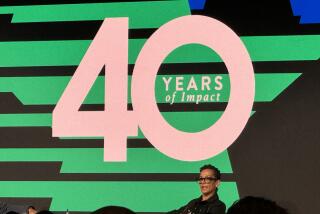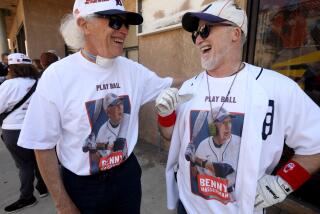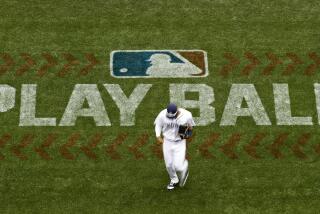Ten years after 9/11, sports remain a healing force
At some point before kickoff, Evan Cascio will slip into that old New York Giants jersey, the one his big brother used to wear. Friends will gather around and they will put the game on television.
“My brother Paul loved sports,” Cascio says. “He was a very big Giants fan.”
This is a tough time of year, a time when he cannot escape the pain of losing Paul, who was at the World Trade Center the morning terrorists hijacked two jetliners and steered them into the towers.
“He was 23,” Cascio says.
Ten years later, the Sept. 11 attacks have not changed sports in this country all that much. Security is a little tighter at stadiums and arenas. A few baseball teams encourage the singing of “God Bless America” during the seventh-inning stretch.
But for some people who lost loved ones on that day, sports have become an unexpected comfort and a touchstone, helping to keep cherished memories alive.
The sights and sounds of the game recall happier days. There is a shared ritual to watching and playing.
For Cascio, a 30-year-old broker who now lives in Southern California, that means subscribing to satellite television so he can follow the Giants, the Yankees and Notre Dame football with a passion that he learned from Paul when they were kids.
“There’s something about sports,” he says. “They make you feel better.”
--
When Erin Finnegan’s husband taught her to play golf, he gave her all the usual tips. Keep your left elbow straight. Drag the club back. He wanted her to visualize each shot beforehand.
Finnegan has changed that around.
“I visualize his swing,” she says. “I literally plant my feet the way he used to plant them. I can visualize how far he took the club back and how gently he ‘crisped’ it.”
Mike Finnegan was working for Cantor Fitzgerald, the financial services firm that lost 658 employees in upper floors of the North Tower. For a long time after his death, Erin wasn’t sure that she wanted to play golf anymore.
Then she realized that Mike, who had grown up around the game, would not be pleased. She asks: “Where else would he want me to be than on the course?”
The 46-year-old mother of three went back to the New Jersey country club where Mike had been the men’s champion and played in the late afternoons, like they used to do.
“Just the two of us out there having fun,” she says. “The way the sun set over the 15th hole — every time we came up to that tee, we’d go, ‘Here’s our favorite hole.’”
Not that it was easy, but Finnegan learned to cherish the game in a new way.
She and her children watched videotapes that Mike made of himself practicing on the range in the early mornings. They started the “Finny’s Hole-In-One Tourney” to benefit a program that teaches golf to mentally and physically disabled kids in Florida.
Finnegan also wrote about her lasting connection to Mike through the game in “The Legacy Letters,” a newly published collection from Sept. 11 families.
Now, whenever she hits a good shot, Finnegan turns to her friends and says: “I just had Finny in my mind.”
It’s that visualization trick.
“To know that I’m golfing and I’m using his swing,” she says. “He’s still with me.”
--
“It’s been 10 years,” Joe DiFazio says. “Memories do fade.”
This is what he remembers: His dad, Vincent, racing home from work each night to be on the couch in time for the first pitch of the Yankees game. Joe would sit on the floor at his feet.
“It was such an event for us to get in front of the TV,” he says. “To have that time together.”
Vincent, also a Cantor Fitzgerald employee, wasn’t there to see his son graduate from high school and college, the big events of a young man’s life. DiFazio marks the passage of time with other milestones.
He wants to talk to his father about players the Yankees have brought up from the minors or trades the team has made. He wants to discuss the strengths and weaknesses of the current lineup.
The 24-year-old isn’t sure what he thinks about the concept of an afterlife, but he knows how he feels watching baseball.
On Sunday, a cousin will accompany him to a sports bar near his new home in North Carolina. At some point, probably after a big play, DiFazio expects he will instinctively turn to say something to his father, a habit he cannot seem to break.
“It kind of doesn’t feel like I’m experiencing it alone,” he says. “I can still feel that connection.”
--
It seems the true value of sports has little to do with winning or losing. There is no final score to the memories that persist.
Evan Cascio watched sports because he wanted to be like his older brother. Football was a little hard to understand, so he kept an eye on Paul sitting beside him.
“When he would cheer, I would cheer,” Cascio says. “Every team I like, I like because of him.”
That is why the old Giants jersey means so much to him. Same with his brother’s Notre Dame jersey and Yankees memorabilia.
Over the last 10 years, Cascio has volunteered for Tuesday’s Children, a nonprofit group that supports families affected by terrorism. Though he moved to Southern California to work as a senior trader for an investment firm, he has kept in touch with Paul’s high school buddies.
They have made a tradition of gathering each September in New York. It is usually a somber occasion but this year, with the anniversary falling on a Sunday, they will watch the Giants play the Washington Redskins.
Cascio suspects that will make a difference.
“I’ve been enjoying myself thinking about it,” he says. “It brings a smile to my face.”
twitter.com/LATimesWharton
More to Read
Start your day right
Sign up for Essential California for news, features and recommendations from the L.A. Times and beyond in your inbox six days a week.
You may occasionally receive promotional content from the Los Angeles Times.







